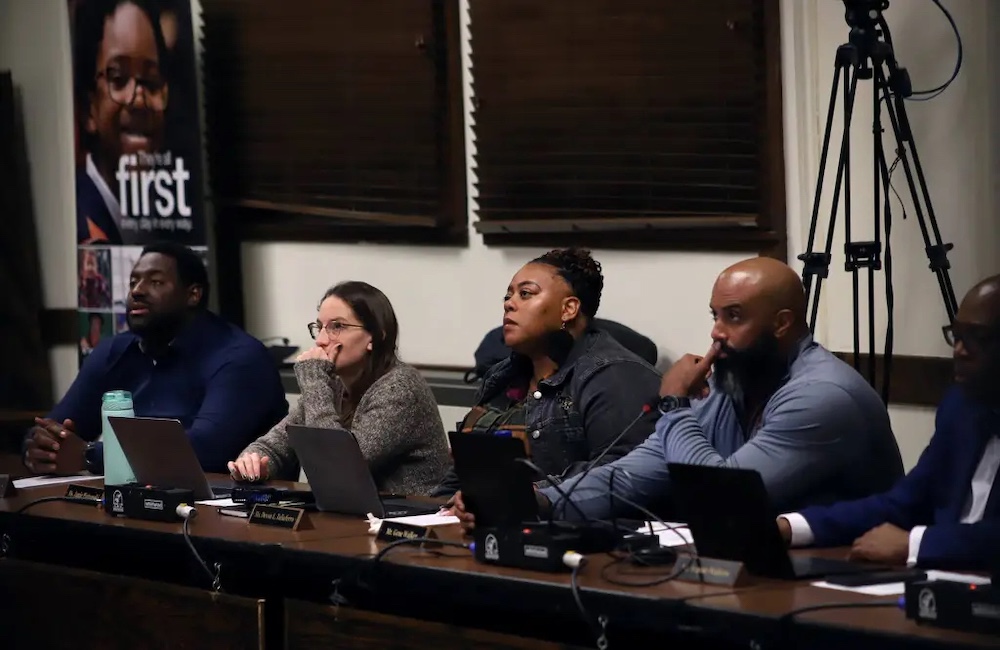
PPS community calls out cuts to summer programming, ESL staffing during budget hearing
Photos courtesy of PublicSource.
Parents speaking at a public hearing Monday said they feel in the dark about the proposed 2025 PPS budget and want to know why the district can’t allocate more to special education and a resumption of the Summer B.O.O.S.T. program.
Pittsburgh Public Schools proposed a $752.3 million general fund budget for 2025, with a projected operating deficit of $28 million, and reflecting a 5% overall increase from the board’s adopted 2024 budget. Some said the district’s unexpected surplus, reported after the year began with a forecasted deficit, should reopen decisions to cut funding and, ultimately, shutter buildings.
“Despite increased enrollment and a surplus, there has been no effort to reconsider this decision or acknowledge the program’s value,” said Ghadah Makoshi, community advocate with the American Civil Liberties Union, referring to the termination of the summer B.O.O.S.T. program.
The proposed budget does not include a tax increase and adheres to the board’s minimum 5% fund balance policy, which requires the district to maintain a fund balance equal to at least 5% of the projected expenditures.
PPS 2025 preliminary general fund budget
• Projected expenditures: $752 million
• Projected revenue: $724 million
• Projected operating deficit: $28 million
According to the latest available records, the district was operating a $5.6 million surplus through the end of October, despite beginning the year with a projected deficit. Ron Joseph, chief financial officer at PPS, said this reflected higher revenues and lower expenditures than expected.
“Projecting debt and then having a surplus seems to be a common practice for PPS, and this does not breed trust,” said parent Vanessa Dagavarian.
Board members are not required to respond to comments during public hearings and are required to vote on the proposed budget before the end of this month.
According to the latest data for the 2024 budget, expenditures from salaries are projected to come in $16.7 million below forecasts by the end of the year, largely because of the impact of current vacancies. The district currently has 172 vacancies across all departments, accounting for $17.2 million in salaries and benefits. If those positions are not filled at the start of 2025, they will continue to reduce the district’s expenditures, said Joseph.
Charter Costs Continue Rising
Charter school costs are projected to exceed forecasts by $3.6 million at the end of 2024. Charters, which receive a majority of their funding from students’ resident school districts, have seen increased enrollment each year, leading to higher charter tuition payments by PPS. In 2025, PPS expects to pay $170 million in charter school tuition.
During a Dec. 3 board meeting, President Gene Walker said charter schools would be a key focus as the district moves forward with its Facilities Utilization Plan of reconfiguring schools that forecasts a spate of closures and consolidations over the coming years. In November, though, the district announced no school closures would take effect during the 2025-26 school year. Superintendent Wayne Walters and district administration are currently working on a feasibility report to present to the board after which board members will vote on the plan.
Shrinking Fund Balance
To cover projected expenditures, the district will have to dip into its fund balance. While it would still adhere to the minimum 5% fund balance policy, that could change soon. According to projections made last December, the district could have a negative fund balance to the tune of $19.4 million by 2027.
The district has projected $167 million in charter school costs in the 2025 budget, an increase of 7.3% over what was expected in the preliminary budget. Overall charter school expenditures account for 22% of the total budget.
Enrollment Steady
PPS reported an enrollment of 18,312 students for the 2024-25 school year, a 0.37% drop from the previous year. In an email statement, Walters said the district made significant progress in stabilizing enrollment and has increased enrollment in key school grades such as elementary and middle grades.
Calls for IEP, ESL investments
Several parents asked the district to reinstate the B.O.O.S.T. program, saying that it was beneficial for services for students with Individualized Education Plans in an inclusive setting. In November, the district announced that it was discontinuing the summer learning program in 2025, citing enrollment challenges and insignificant impact on student achievement according to data analysis.
Since 2021, the B.O.O.S.T. program relied on pandemic-relief ESSER funds, which ended in September.
Paulette Foster of 412 Justice said the district should provide that data and prove why the B.O.O.S.T. program is no longer viable.
Community members called out the budget’s lack of transparency. Anne Farris, a parent at Dilworth Traditional Academy, said the budget did not include information about the number of classroom teachers, principals, counselors, social workers and central office staff, which was included in previous budgets.
The budget also proposes reducing the number of classroom teachers and paraprofessionals in the English Language Development department. English Language Learners are one of the fastest-growing student populations in the district, increasing by 25% this year.
Farris also questioned the $1.3 million allocation for the office of deputy superintendent, despite PPS not having hired a deputy superintendent.
“It’s alarming to see the proposed budget shows a drastic reduction in the number of ESL teachers from 51 and a half to 23 and a half, and ESL instructional paraprofessionals from 16 to zero with no explanation,” said Farris. “The board must have this data before approving the budget, as it directly impacts the quality of education.”













